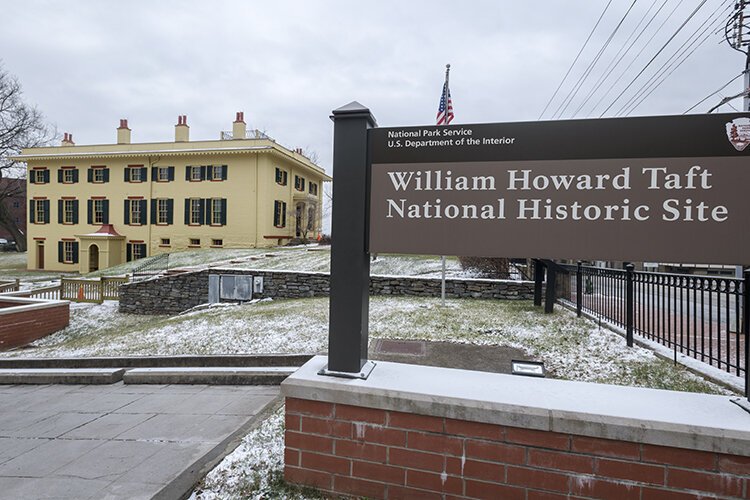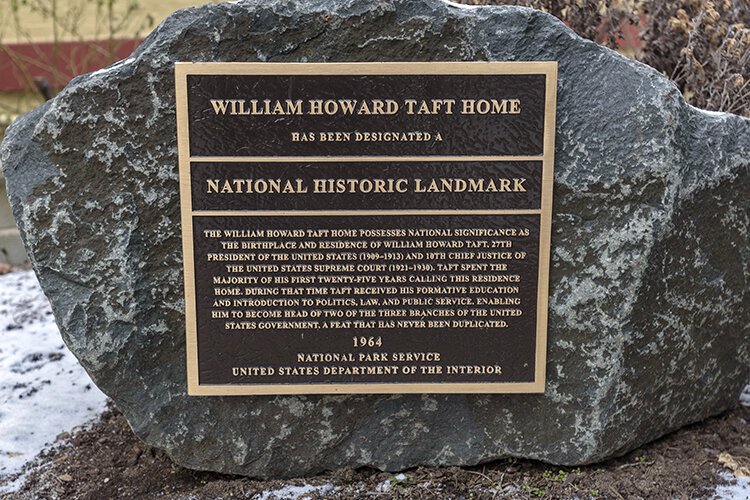Ohio Civics Essential: A look back at our state’s presidents and how they shaped today’s parties
During this presidential inaugural season, a look back at inaugural speeches by the eight presidents from Ohio shows that each had plenty to say, rightly or wrongly, about issues that still resonate today, like elections, balance of power, race, immigration and foreign policy.

Voter fraud accusations. Stolen election claims. Party divisions. Civil war rumblings. These terms have grown sadly familiar in today’s national politics but it’s not the first time.
In the 1876 presidential election, Republican Rutherford B. Hayes won the electoral college tally but lost the popular vote to Democrat Samuel J. Tilden. Allegations of voter fraud tainted the election, and some Democrats in southern states even called for civil war, just a decade after the first Civil War ended.
Instead of war, Republicans and Democrats appointed a commission, consisting of representatives from both parties, to resolve the mess. The commission’s controversial Compromise of 1877 gave Hayes the presidency. In exchange, Republicans agreed to withdraw federal troops that had occupied the South since the end of the Civil War.
“This was by far the most contentious election in our history, even more than Bush/Gore in 2000,” says Kevin Kern, associate professor of history at the University of Akron. “Some Democrats felt the election was stolen. It took bargaining in smoke-filled rooms to reach a compromise.”
In his March 5, 1877 inaugural address, Hayes discussed the compromise and tried to settle the nation. He said commission members who selected him president were honest and intelligent, and their judgment was trustworthy, although he acknowledged that some doubted their wisdom.
Then Hayes said something that might apply today.
“Upon one point there is unanimity in public sentiment — that conflicting claims to the presidency must be amicably and peaceably adjusted, and that when so adjusted, the general acquiescence of the nation ought surely to follow,” Hayes said.
President Benjamin Harrison, in his March 4, 1889 inaugural speech, also touched upon the sacredness of elections, warning that loyalty to political party over country can threaten the republic.
“A party success that is achieved by unfair methods or by practices that partake of revolution is hurtful and evanescent, even from a party standpoint,” Harrison, a Republican, said. “We should hold our differing opinions in mutual respect, and having submitted them to the arbitrament of the ballot, should accept an adverse judgment with the same respect that we would have demanded of our opponents if the decision had been in our favor.”
In this presidential inaugural season, a look back at inaugural speeches by the eight presidents from Ohio, including Hayes and Harrison, shows that each had plenty to say, rightly or wrongly, about issues that still resonate today, although their status in history varies. Those issues include elections, balance of power, race, immigration and foreign policy.
In addition to Hayes and Harrison, both one-termers, the Ohio presidents were:
· William Henry Harrison, who died of pneumonia just weeks after his inauguration in 1841;
· Ulysses S. Grant, who served two terms from 1869-1877;
· James A. Garfield, assassinated just months after his inaugural address in 1881;
· William McKinley, president from 1897-1901 but who was assassinated after his second inauguration in 1901;
· William Howard Taft, who served from 1909-1913;
· Warren G. Harding, who was president from 1921-1923 before dying in office.
Elections and political parties
Chester Pach, associate professor of history at Ohio University, says presidential elections, including those involving the Ohio presidents, were typically close in the late 1800s and early 1900s. In 1880, for example, Garfield, a Republican, defeated Democrat Winfield Scott Hancock with 48.3% of the vote to Hancock’s 48.2%. Benjamin Harrison lost the popular vote to Grover Cleveland in 1888 but prevailed in the electoral college.
With races so tight, both parties sometimes bent and even broke the rules to gain an advantage.
“Elections could be a dirty business,” Pach says. “Corruption wasn’t endemic, but there were some states where tactics to get out the vote approached the line of being unethical or illegal, or crossed the line. A little shift one way or the other made a difference.”
In his inaugural address, Benjamin Harrison expressed support for Thomas Jefferson’s position of keeping the federal government out of elections and allowing states to follow their own election laws. However, Harrison said the federal government must intervene in some cases by forcing states to abide by their own election rules.
“In the South after the Civil War and Reconstruction, the states eroded the voting rights of Blacks through restrictive laws,” Kern says. “Under one law, if your grandfather was unable to vote, you weren’t allowed to vote, although the Supreme Court eventually struck that down. The South was creative in stopping Blacks from voting.”
William Henry Harrison, in his inaugural speech, followed George Washington’s lead decades earlier and cautioned against the formation of political parties, saying the spirit of party is “violent.” Harrison said competing parties can check each other from violating the law and Constitution, but beyond that, parties destroy public virtue and antagonize, and even conquer, liberty.
Decades later, Benjamin Harrison agreed.
“No political party can long pursue advantage at the expense of public honor or by rude indecent methods without protest and fatal disaffection in its own body,” Benjamin Harrison said in his inaugural speech.
American Indians
A common theme in the inaugural speeches of most Ohio presidents was the country’s treatment of American Indians and freed Blacks. They agreed that Indians and Blacks had rights, but only to a point.
“Every time there is a statement extolling the rights of native Americans or African Americans, there is qualifying language, indicating a systemic way of differentiating them from white people,” Pach says. “They talk about civilized vs. uncivilized, educated vs. uneducated.”
William Henry Harrison, a former Indian fighter, supported granting liberty and justice to American Indians, saying that a powerful nation like the United States would gain God’s favor by caring for a “weaker” and “uncivilized” people.
Pach says that starting in the years leading to the Civil War, some well-meaning people believed Indians, for their own benefit, should abandon their own culture and assimilate into white culture. Otherwise, they would become extinct. Pach said that viewpoint was actually destructive.
“For one thing, it opened door to legislation that broke up tribal lands and tried to divide them into individual holdings, which were then supposed to go back to Indians,” Pach says. “But in the way it was implemented, a lot of the land fell into the hand of speculators, who used it for other purposes.”
Grant, in his two inaugural addresses, said he wanted to guide American Indians toward civilization and citizenship. The alternative, he said, was a war of extermination, which he opposed.
“Grant had a paternalistic and condescending view of Indians, but at least he saw them as human beings who should not be killed,” Kern says. “He thought we just had to get rid of their culture and assimilate them.”
Pach says Grant’s record on the treatment of American Indians was mixed. He points out that the Battle of the Little Bighorn, part of the Great Sioux War of 1876, occurred at the end of his second term. Federal troops attacked and destroyed Indian camps and property during the war.
Freed Blacks
Seven of the Ohio presidents, the exception being William Henry Harrison, served after enslaved Blacks were freed, and like Abraham Lincoln, all seven were Republicans.
Grant said the Civil War made Blacks free citizens, but added that they didn’t possess the civil rights that citizenship should carry. He vowed to change that.
In many ways, Grant did so. Under his watch, the Constitution’s Fifteenth Amendment, which gave Blacks the vote, was ratified. It was something he called for in his inaugural address. Kern says Grant used the federal government to ensure that Blacks could vote in the South, and he assigned federal troops to break up the first version of the Ku Klux Klan.

“Grant did more for civil rights than any other president until Lyndon B. Johnson in the 1960s,” Kern says.
However, in his inaugurals, Grant said federal legislation should not “advance the social status of the colored man.” Blacks should only be given a fair chance “to develop what there is good in him.”
“Grant was saying Blacks should have the right to vote but not necessarily the right to live next door to someone,” Pach says.
Hayes recognized that race relations in the South were atrocious. With federal troops leaving the South under the Compromise of 1877, he urged local governments there to guard the interests of whites and Blacks equally. If not, he said, the federal government would intervene.
“Let me assure my countrymen of the southern states that it is my earnest desire to regard and promote their truest interest — the interests of the white and of the colored people both and equally — and to put forth my best efforts in behalf of a civil policy which will forever wipe out in our political affairs the color line and the distinction between North and South, to the end that we may have not merely a united North or a united South, but a united country,” Hayes said.
Nevertheless, laws discriminating against Blacks evolved in the South. Garfield, in his speech, accused the South of failing to bestow full citizenship on Blacks. He called that an evil and said it must stop.
But Garfield added that uneducated and ignorant voters were a danger to the republic. He wanted “universal education” for everyone.
The problem with that view, Kern points out, is that Blacks were barred from education in the South at the same time the right to vote was being withheld from them.
About 30 years later, Taft, in his inaugural address, said states in the South still hadn’t enforced the Fifteenth Amendment. He insisted they start doing so, although Kern says Taft really didn’t believe Blacks were equal.
“The Negroes are now Americans,” Taft said. “Their ancestors came here years ago against their will, and this is their only country and their only flag. They have shown themselves anxious to live for it and to die for it … We are charted with the sacred duty of making their path as smooth and easy as we can.”
Harding, speaking generally in his inaugural speech, said complete equality would never exist because everyone has different talents and abilities. However, he said the country should avoid “great blotches of distressed poverty” that can lead to “evil consequences.”
Immigration
Benjamin Harrison said the country should amend its immigration laws so that “the character and good disposition” of immigrants should be considered before granting citizenship. Prospective citizens should understand their duties and have knowledge of American institutions.
“We should not cease to be hospitable to immigration, but we should cease to be careless as to the character of it,” Harrison said in his inaugural. “There are men of all races, even the best, whose coming is necessarily a burden upon our public revenues or a threat to social order. These should be identified and excluded.”
McKinley, speaking a few years after Harrison, agreed, saying that the nation must improve immigration laws so that prospective citizens “are not ignorant or vicious.” Taft discouraged immigration from Asian countries. He believed Asians didn’t integrate well with Americans.
Kern says government leaders were cautious toward immigrants because they feared they would bring radical ideas here. At the same time, businesses liked immigrants because they were a source of cheap labor. Kern says no meaningful immigration restrictions would come until after World War I.
Foreign policy

Most Ohio presidents held a simple philosophy on foreign policy — we’ll stay out of your business if you stay out of ours. They believed in the Monroe Doctrine, which purported that overseas governments should not attempt to establish colonies in the Western Hemisphere.
“There was a clear belief that what happened in Europe, at least until World War I, didn’t really affect the United States, Pach says. “The best thing to do was to stay out of Europe’s affairs and keep them from spreading influence in the Americas.”
Grant was typical in this belief. He said he would respect the rights of other countries and treat them fairly if they were reciprocal. Pach says Benjamin Harrison was concerned about British involvement in Latin America, so Harrison, during his inaugural speech, said that since the United States doesn’t try to control weaker neighbors, it expects that European powers will not try to colonize countries on this side of the Atlantic Ocean.
A foreign policy shift among Ohio presidents may have started with McKinley, due to the 1898 Spanish-American War in and around Cuba, and the Philippine-American War, which started in 1899. In his first inaugural speech in 1897, before the wars, McKinley said he wanted peace with other nations, and that the United States didn’t need to fight for more territory. The country should negotiate with countries when disagreements arose, he said.
In his second inaugural, after the two wars broke out, McKinley talked about the importance of building a strong army and navy.
Ryan Barrilleaux, professor of political science at Miami University in Oxford, says the United States grew into an imperial power at this time, gaining possession of both Cuba and the Philippines.
“The standard view for a long time was that McKinley embraced imperialism, but there are scholars who argue that he accepted it only reluctantly,” Barrilleaux says.
In his inaugural address, Taft said the United States must spend money on a “proper army” that can grow quickly from a small force to a larger one if necessary. At the time, events that would eventually lead to World War I were erupting in Europe.
Taft promoted peace but said, “we (would) be blind to existing conditions and (would) allow ourselves to become foolish idealists if we did not realize that, with all the nations of the world armed and prepared for war, we must be ourselves in a similar condition, in order to prevent other nations from taking advantage of us and our inability to defend our interests and assert our rights with a strong hand.”
Harding, in his inaugural, spoke almost exclusively about the aftermath of World War I. He agreed with the decision to stay out of the League of Nations, which his predecessor, Woodrow Wilson, created, and wanted to avoid permanent alliances that might compromise the country. Pach says Harding worried that revolutions in other countries would recur here.
“Confident of our ability to work out our own destiny, and jealously guarding our right to do so, we seek no part in directing the destinies of the Old World,” Harding said. “We do not mean to be entangled. We will accept no responsibility except as our own conscience and judgment, in each instance, may determine.”
Take our Civics Essential quiz to test your Ohio Presidents knowledge here.
Support for Ohio Civics Essential is provided by a strategic grant from the Ohio State Bar Foundation to improve civics knowledge of Ohio adults.
The views expressed herein do not necessarily represent those of the Ohio State Bar Foundation.













